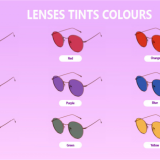Blue Light Glasses vs. Polarized Sunglasses: Unveiling the Eye Protection Battle
In this modern era dominated by screens and sunlight, protecting our eyes has become a top priority. With the increasing awareness of eye strain and potential damage caused by blue light and harmful UV rays, two contenders have emerged as the frontrunners in the eye protection game: blue light glasses and polarized sunglasses. But which one is the ultimate champion? Join us as we unravel the battle between blue light glasses and polarized sunglasses to help you make an informed choice.
Understanding the Enemies
- Blue Light Glasses :
- Blue light glasses are specially designed to filter out or reduce the amount of blue light emitted from digital screens.
- They feature specialised lenses that block or absorb blue light wavelengths.
- Blue light is known to disrupt sleep patterns, cause eye strain, and potentially contribute to long-term eye damage.
- Blue light glasses gained popularity as a solution for individuals spending extended hours in front of screens.
Polarized Sunglasses :
- Polarized sunglasses are designed to reduce glare and block harmful UV rays from the sun.
- They feature lenses with a special polarized filter that blocks horizontally polarized light, such as glare reflected from surfaces like water, roads, or snow.
- Glare reduction enhances visual comfort and clarity while reducing eye fatigue.
- Polarized sunglasses are commonly used for outdoor activities and driving to provide superior eye protection.
Protecting the Eyes in Different Environments
A. Blue Light Glasses :
- Blue light glasses are tailored for indoor use, primarily to combat the harmful effects of digital screens.
- They are ideal for individuals who spend prolonged periods working on computers, laptops, or smartphones.
- By reducing the amount of blue light entering the eyes, they help alleviate eye strain and prevent disruption to sleep patterns.
B. Polarized Sunglasses :
- Polarized sunglasses are designed to shield your eyes from the sun’s UV rays and reduce glare.
- They are indispensable when engaging in outdoor activities like driving, fishing, skiing, or spending time at the beach.
- Polarized lenses significantly enhance visibility by eliminating glare, making them a go-to option for those exposed to bright sunlight.
Eye Health Benefits
A. Blue Light Glasses:
- By reducing the amount of blue light reaching the eyes, blue light glasses aim to minimize the risk of digital eye strain.
- They can help alleviate symptoms like dry eyes, blurred vision, headaches, and neck or shoulder pain caused by prolonged screen time.
- Some studies suggest that prolonged exposure to blue light may contribute to macular degeneration, making blue light glasses a potential preventive measure.
b. Polarized Sunglasses:
- The primary advantage of polarized sunglasses lies in their ability to eliminate glare caused by sunlight reflecting off surfaces.
- By reducing glare, polarized lenses enhance visual comfort and prevent squinting, which can lead to eye strain and fatigue.
- Polarized sunglasses also provide essential protection against UV rays, which can cause short-term discomfort (like photokeratitis) and long-term eye damage (like cataracts or macular degeneration).
Limitations and Considerations
a. Blue Light Glasses:
- Blue light glasses are not universally recommended for everyone.
- While they offer benefits for individuals spending extended hours in front of screens, the impact on eye health may vary.
- Some experts argue that blue light from screens does not pose a significant threat, while others emphasise the importance of proactive protection.
- Additionally, blue light glasses do not provide protection against UV rays or glare from sunlight.
b. Polarized Sunglasses:
Although polarized sunglasses excel at reducing glare and protecting against UV rays, they have a few limitations worth considering:
- Not all polarized sunglasses are created equal. Quality varies among brands, and some low-quality polarized lenses may not provide adequate protection.
- Polarized sunglasses may reduce visibility of certain digital screens, such as LCD displays, making it challenging to read them.
- Some activities, like downhill skiing or snowboarding, may require non-polarized lenses to maintain optimal visibility of icy patches or potential hazards.
Fashion and Style
A. Blue Light Glasses :
- Blue light glasses have become a trendy accessory in recent years, with a wide range of styles and designs available.
- They offer an opportunity to express personal style while providing eye protection.
- From retro frames to sleek and modern designs, blue light glasses cater to various fashion preferences.
B. Polarized Sunglasses:
- Polarized sunglasses have long been associated with style and fashion.
- They come in a plethora of frame shapes, lens colors, and styles to suit different face shapes and personal tastes.
- Whether you prefer classic aviators, sporty wraparounds, or trendy cat-eye frames, polarized sunglasses offer both functionality and a fashion statement.
Prescription Options
a. Blue Light Glasses:
- Blue light glasses are available in prescription options, making them accessible to individuals who require corrective lenses.
- People with vision impairments can benefit from the added blue light protection without compromising their visual clarity.
b. Polarized Sunglasses:
- Prescription polarized sunglasses are also available, allowing those with vision correction needs to enjoy both clear vision and eye protection.
- Prescription options offer a versatile solution for individuals who require vision correction while engaging in outdoor activities.
Final Thoughts –
In the battle between blue light glasses and polarized sunglasses, both contenders bring significant benefits to the table. Ultimately, the choice depends on your specific needs and lifestyle. If you find yourself spending extended hours in front of screens, blue light glasses might be a worthy investment. Conversely, if you’re frequently exposed to bright sunlight or enjoy outdoor activities, polarized sunglasses are a must-have. Remember, eye protection is crucial in maintaining optimal eye health, so choose wisely and keep your eyes safe and stylish in any situation.


